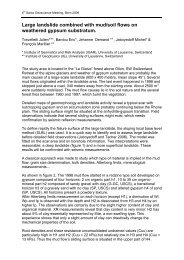Open Session - SWISS GEOSCIENCE MEETINGs
Open Session - SWISS GEOSCIENCE MEETINGs
Open Session - SWISS GEOSCIENCE MEETINGs
Create successful ePaper yourself
Turn your PDF publications into a flip-book with our unique Google optimized e-Paper software.
Peak oil or not peak, that is the question<br />
Stampfli Gérard M.<br />
Université de Lausanne, Institut de Géologie et Paléontologie, Anthropole 1015 lausanne<br />
gerard.stampfli@unil.ch<br />
Peak oil or not peak, that is the question<br />
The whole world is looking at the price of the barrel of oil with a renewed interest since the beginning of 2008,<br />
and it became a common subject of discussion if not of worries. Most people and all sorts of experts are also<br />
speculating on the world oil reserves, and the most often asked question is: for how long do we have oil?<br />
Unfortunately, and despite the experts confident statements, any answer to that question is bound to be wrong,<br />
so is any speculation on the future price of the barrel. It is clear that there is still a lot of oil around and certainly<br />
some major quantities to be found in the near future, but what is certain is that, one day, we will run out of<br />
oil, and this is the only certainty regarding this global problem.<br />
So, we certainly need to worries about the reserves, but on the short term the worries is about the capacities of<br />
production of the oil exporting countries. Any oil geologist would know that producing oil is an intricate business,<br />
blending technologies, a bit of luck and geological know-how, the latter being the most important, as<br />
structures in which the oil is trapped can be highly complicated in terms of distribution and quality of reservoirs,<br />
and often also in terms of structural trapping, to speak only of the obvious problems. To increase oil production<br />
is not a simple affair, in many instances it would take years to do so intelligently in order not to jeopardize<br />
future production. So, the hope that from the 80 M bpd production of a few years ago, a figure of 100 M<br />
bpd could be reached in the coming 10 years is a real gamble, and might prove to be impossible, despite the<br />
reserves. As the demand will certainly persist (at least from emerging countries such as China), we can be sure<br />
that the price of the barrel will go up. On the other hand, if it goes up too much, consumption will slow down,<br />
but slowing the consumption of oil means a decrease in economic profit and will inevitably run into recession.<br />
Then, can some sort of balance be found? it could be possible if speculation was not part of the game and if<br />
large parts of the world population were indeed ready to decrease their standard of living,. This sounds really<br />
unrealistic!<br />
On the longer term, and as shortage there will be, a proper track of actions should be taken in order to avoid<br />
any sort of major worldwide crisis touching mainly the trading of merchandises, the main oil consuming factor<br />
in our modern world. Indeed, everything is transported, including billions of people on a daily basis, and mainly<br />
with oil. If we just wait for the shortage to come, we shall face major disasters such as famines and industrial<br />
and social unrests in the populated areas of the planet, so, everywhere… It has been shown that mitigation programs<br />
starting 20 year before the oil production peak are necessary in order to avoid a major crash in production,<br />
thus a major crash of the society. Some mitigation programs were started some years ago with the implementation<br />
of new and alternative sources of energy, but so far these are absolutely unable to replace oil for<br />
transportation of goods and people. Proper worldwide mitigation programs in term of reduction of oil in transportation<br />
just do not exist, and as most experts agree that we have already passed the oil peak, it seems that an<br />
oil crash is inevitable.<br />
Thus, we shall be forced to travel less and buy locally. Most of us might be ready to do so, but can we do it? The<br />
main problem here is that politicians cannot implement and encourage such a responsible behaviour and for<br />
several reasons; the first one being that they just don’t care about it, by ignorance or willingly, the other main<br />
reason is that the economy is not working in that direction whatsoever, the persistent “philosophy” being: the<br />
cheapest the better! And the politicians have no say in that process.<br />
So, the solution is really in the hands and consciousness of the consumers, everyone of us… Besides a pro-active<br />
behaviour to buy locally, we should realised and be convinced that chasing the cheapest product is a highly<br />
egoistical behaviour, it may give us the illusion to generate jobs in some remote parts of the world, but what we<br />
give to these people is a promise for poverty and struggle for life in which millions shall perish. If we cannot<br />
change our consumer habits so easily –although we might soon be forced to do so, we could at least try to change<br />
our consciousness and open to the fact that the rich exist because the poor exist, and try to do our best for<br />
this situation not to remain for ever.<br />
Plenary <strong>Session</strong>









